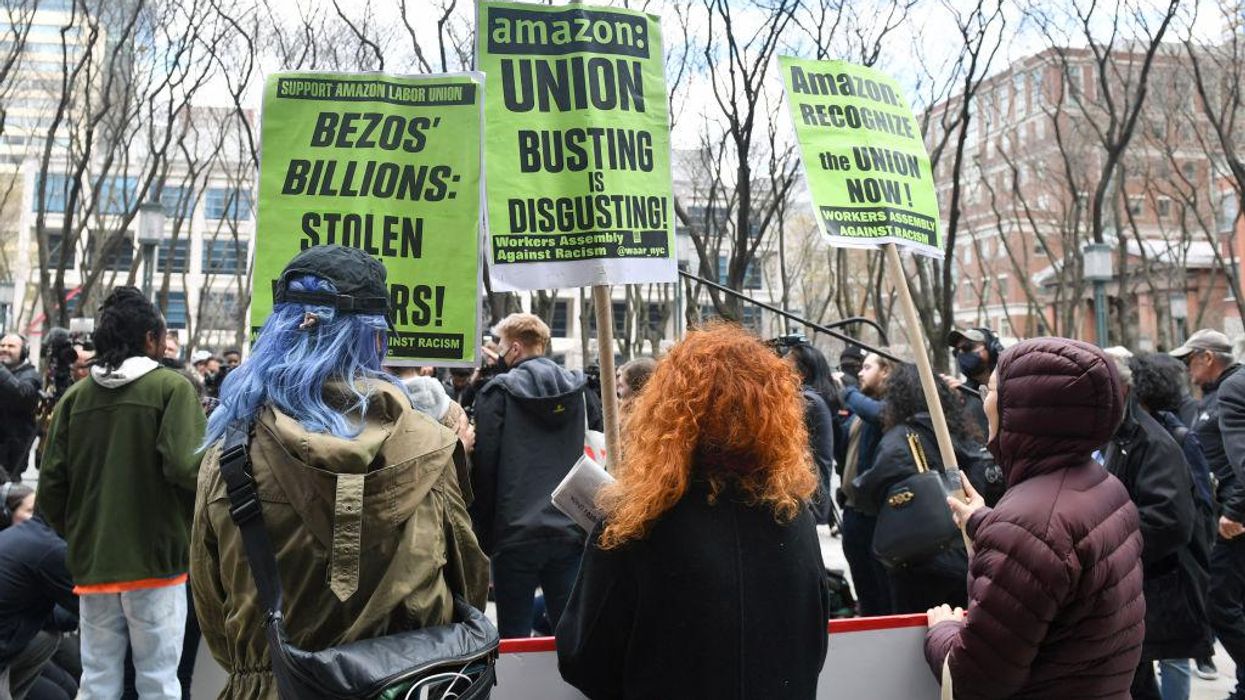
ANDREA RENAULT/AFP via Getty Images

In a move designed to appease pro-union progressives and strike a blow against Amazon, the National Labor Relations Board's general counsel will ask the board to strip companies of certain free speech rights, which would overturn more than seven decades of legal precedent.
In a memo sent last week, NLRB general counsel Jennifer Abruzzo declared her intention to ask the board to reconsider an employer's right to hold "captive audience" meetings, mandatory meetings that companies sometimes use to argue against worker efforts to form a union. Progressives argue that requiring employees to listen to anti-union rhetoric while at work is a coercive and unlawful practice, while their opponents say companies have a recognized and statutorily protected First Amendment right to express their opposition to unionization.
Abruzzo's memo makes the progressive argument. She wrote to NLRB field offices across the country on April 7 that captive audience meetings "inherently involve an unlawful threat that employees will be disciplined or suffer other reprisals if they exercise their protected right not to listen to such speech.” She claims that NLRB case precedent — settled law — was wrongly decided and that the board should "reconsider such precedent and find mandatory meetings of this sort unlawful."
The specific case Abruzzo refers to is the NLRB's 1948 decision in Babcock & Wilcox, where the Board concluded that companies could compel employees to attend anti-union meetings without violating the National Labor Relations Act. That decision was based on part of the law that says, "The expressing of any views, argument, or opinion, or the dissemination thereof ... shall not constitute or be evidence of an unfair labor practice."
Abruzzo argues the Board's decision 74 years ago is "inconsistent" with labor law.
“This license to coerce is an anomaly in labor law, inconsistent with the Act’s protection of employees’ free choice. It is based on a fundamental misunderstanding of employers’ speech rights,” she wrote in the memo. “I believe that the NLRB case precedent, which has tolerated such meetings, is at odds with fundamental labor-law principles, our statutory language, and our Congressional mandate. Because of this, I plan to urge the Board to reconsider such precedent and find mandatory meetings of this sort unlawful.”
Progressive attacks on captive audience meetings have become something of a cause célèbre during the labor dispute at Amazon. As Amazon warehouse employees in Bessemer, Alabama, and New York City have tried to unionize, the company has held meetings to dissuade them. The New York Times reported in March that Amazon has held "hundred of meetings with workers to discourage them from supporting a union."
Union supporters say they want to improve health and safety conditions at Amazon warehouses and receive better pay and treatment from management. They've accused Amazon of misrepresenting the benefits of unionization at these mandatory meetings and filed complaints with the NLRB accusing the company of trying to coerce workers against unionization.
Abruzzo's memo, however, has been criticized for attempting to rewrite settled law on this question without input from Congress. The Wall Street Journal editorial board wrote in an editorial that the general counsel's memo "is a thumb in the eye of Congress and the Constitution."
"Companies can clearly require employees to attend meetings — say, to discuss productions goals or workplace morale. Banning any mention of unionization at a meeting, or its impact on company performance, is blatant speech regulation. Congress has been aware of the Babcock & Wilcox decision for decades and has never overruled it," the Journal's editorial board argued.